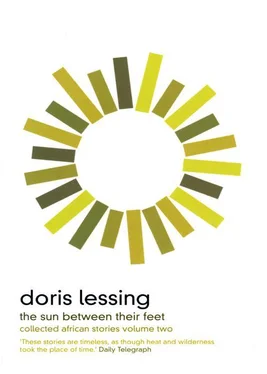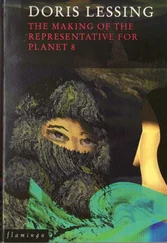It was then that I saw the pawpaw tree. I must have been staring at it for some minutes before it grew in on my sight; for it was such an odd place for a pawpaw tree to be. On it were three heavy yellow pawpaws.
‘There’s our breakfast,’ I said.
We shook them down, sat on the ground, and ate. The insipid creamy flesh soon filled us, and we lay down, staring at the sky, half asleep. The sun blared down; we were melted through with heat and tiredness. But it was very hard. Turning over, staring, we saw worn bricks set into the ground. All round us were stretches of brick, stretches of cement.
‘The old Thompson house,’ we whispered.
And all at once the pigeons seemed to grow still and the bush became hostile. We sat up, frightened. How was it we hadn’t noticed it before? There was a double file of pawpaws among the thorns; a purple bougainvillaea tumbled over the bushes; a rose tree scattered white petals at our feet; and our shoes were scrunching in broken glass.
It was desolate, lonely, despairing; and we remembered the way our parents had talked about Mr Thompson who had lived here for years before he married. Their hushed, disapproving voices seemed to echo out of the trees; and in a violent panic we picked up the gun and fled back in the direction of the house. We had imagined we were lost; but we were back in the gully in no time, climbed up it, half sobbing with breathlessness, and fled through that barrier of bush so fast we hardly noticed it was there.
It was not even breakfast-time.
‘We found the Thompsons’ old house,’ we said at last, feeling hurt that no one had noticed from our proud faces that we had found a whole new world that morning. ‘Did you?’ said Father absently. ‘Can’t be much left of it now.’
Our fear vanished. We hardly dared look at each other for shame. And later that day we went back and counted the pawpaws and trailed the bougainvillaea over a tree and staked the white rosebush.
In a week we had made the place entirely our own. We were there all day, sweeping the debris from the floor and carrying away loose bricks into the bush. We were not surprised to find dozens of empty bottles scattered in the grass. We washed them in a pothole in the vlei, dried them in the wind, and marked out the rooms of the house with them, making walls of shining bottles. In our imagination the Thompson house was built again, a small brick-walled place with a thatched roof.
We sat under a blazing sun, and said in our Mother’s voice: ‘It is always cool under thatch, no matter how hot it is outside.’ And then, when the walls and the roof had grown into our minds and we took them for granted, we played other games, taking it in turn to be Mr Thompson.
Whoever was Mr Thompson had to stagger in from the bush, with a bottle in her hand, tripping over the lintel and falling on the floor. There she lay and groaned, while the other fanned her and put handkerchiefs soaked in vlei water on her head. Or she reeled about among the bottles, shouting abusive gibberish at an invisible audience of natives.
It was while we were engaged thus, one day, that a black woman came out of the thorn trees and stood watching us. We waited for her to go, drawing together; but she came close and stared in a way that made us afraid. She was old and fat, and she wore a red print dress from the store. She said in a soft, wheedling voice: ‘When is Boss Thompson coming back?’
‘Go away!’ we shouted. And then she began to laugh. She sauntered off into the bush, swinging her hips and looking back over her shoulder and laughing. We heard that taunting laugh away among the trees; and that was the second time we ran away from the ruined house, though we made ourselves walk slowly and with dignity until we knew she could no longer see us.
For a few days we didn’t go back to the house. When we did we stopped playing Mr Thompson. We no longer knew him: that laugh, that slow, insulting stare had meant something outside our knowledge and experience. The house was not ours now. It was some broken bricks on the ground marked out with bottles. We couldn’t pretend to ourselves we were not afraid of the place; and we continually glanced over our shoulders to see if the old black woman was standing silently there, watching us.
Idling along the fence, we threw stones at the pawpaws fifteen feet over our heads till they squashed at our feet. Then we kicked them into the bush.
‘Why have you stopped going to the old house?’ asked Mother cautiously, thinking that we didn’t know how pleased she was. She had instinctively disliked our being there so much.
‘Oh, I dunno …’
A few days later we heard that the Thompsons were coming to see us; and we knew, without anyone saying, that this was no ordinary visit. It was the first time; they wouldn’t be coming after all these years without some reason. Besides, our parents didn’t like them coming. They were at odds with each other over it.
Mr Thompson had lived on our farm for ten years before we had it, when there was no one else near for miles and miles. Then, suddenly, he went home to England and brought a wife back with him. The wife never came to this farm. Mr Thompson sold the farm to us and bought another one. People said:
‘Poor girl! Just out from home, too.’ She was angry about the house burning down, because it meant she had to live with friends for nearly a year while Mr Thompson built a new house on his new farm.
The night before they came, Mother said several times in a strange, sorrowful voice, ‘Poor little thing; poor, poor little thing.’
Father said: ‘Oh, I don’t know. After all, be just. He was here alone all those years.’
It was no good; she disliked not only Mr Thompson but Father too, that evening; and we were on her side. She put her arms round us, and looked accusingly at Father. ‘Women get all the worst of everything,’ she said.
He said angrily: ‘Look here, it’s not my fault these people are coming.’
‘Who said it was?’ she answered.
Next day, when the car came in sight, we vanished into the bush. We felt guilty, not because we were running away, a thing we often did when visitors came we didn’t like, but because we had made Mr Thompson’s house our own, and because we were afraid if he saw our faces he would know we were letting Mother down by going.
We climbed into the tree that was our refuge on these occasions, and lay along branches twenty feet from the ground, and played at Mowgli, thinking all the time about the Thompsons.
As usual, we lost all sense of time; and when we eventually returned, thinking the coast must be clear, the car was still there. Curiosity got the better of us.
We slunk on to the veranda, smiling bashfully, while Mother gave us a reproachful look. Then, at last, we lifted our heads and looked at Mrs Thompson. I don’t know how we had imagined her; but we had felt for her a passionate, protective pity.
She was a large, blonde, brilliantly coloured lady with a voice like a go-away bird’s. It was a horrible voice. Father, who could not stand loud voices, was holding the arms of his chair, and gazing at her with exasperated dislike.
As for Mr Thompson, that villain whom we had hated and feared, he was a shaggy and shambling man, who looked at the ground while his wife talked, with a small apologetic smile. He was not in the least as we had pictured him. He looked like our old dog. For a moment we were confused; then, in a rush, our allegiance shifted. The profound and dangerous pity, aroused in us earlier than we could remember by the worlds of loneliness inhabited by our parents, which they could not share with each other but which each shared with us, settled now on Mr Thompson. Now we hated Mrs Thompson. The outward sign of it was that we left Mother’s chair and went to Father’s.
Читать дальше












